In 2014, ICNC launched the Curriculum Fellowship Program to support development of courses on nonviolent conflict and promote teaching in the growing field of civil resistance studies. That year, seven fellows were selected, and the following year (2015) there were six fellows.
In 2016, ICNC has selected six fellows to help them introduce or expand existing curricular and educational activities in the field of civil resistance. Some of these fellows will teach class-based curses at their affiliated academic institutions in the United States and Portugal, while others will develop and run online academic seminars for the Brazilian, Vietnamese and African audiences as part of the ICNC curriculum support.
We are featuring three final evaluation and learning assessment reports from the 2016 Fellows. The reports demonstrate a significant impact the ICNC-supported classroom-based and online courses have had on their participants and on learning about civil resistance and nonviolent movements, in general.
- Clay Fuller, 2016 ICNC Curriculum Fellow. Clay’s course evaluation & learning assessment
- Lilit Makunts, 2016 ICNC Curriculum Fellow. Lilit’s course evaluation & learning assessment
- Etiene Martins, 2016 ICNC Curriculum Fellow. Etiene’s course evaluation & learning assessment
2016 Fellows include:
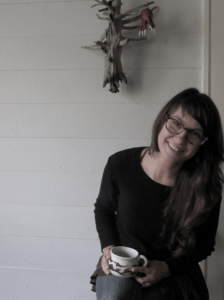 Courtney Cook is an educator, activist, and artist. She is currently a doctoral student in the Curriculum and Instruction Department at the University of Texas at Austin. Specializing in Cultural Studies in Education, Courtney’s research focuses on critical pedagogy and humanizing dialogue as a means of engaging with systemic injustice, cultural trauma, and contemporary violence. She completed her Master’s Degree at Boston University in African American Studies in 2008 where she focused on American slavery, the Civil Rights and Black Power Movements, collective memory, trauma and literature.
Courtney Cook is an educator, activist, and artist. She is currently a doctoral student in the Curriculum and Instruction Department at the University of Texas at Austin. Specializing in Cultural Studies in Education, Courtney’s research focuses on critical pedagogy and humanizing dialogue as a means of engaging with systemic injustice, cultural trauma, and contemporary violence. She completed her Master’s Degree at Boston University in African American Studies in 2008 where she focused on American slavery, the Civil Rights and Black Power Movements, collective memory, trauma and literature.
As a long-time English teacher, Courtney used literature and creative writing to invite her students into critical dialogue regarding civic responsibility and issues of power, race, class, gender, and ideology. As an activist and artist she has taught creative writing in prisons and worked with young people in processes of overcoming a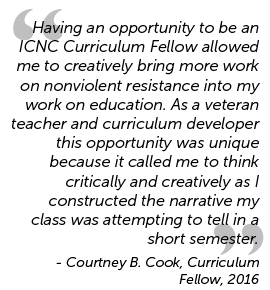 ddiction. Currently she is teaching future educators about issues of race, class, gender, political oppression, and civil resistance, and is the co-organizer of the 5th annual Cultural Studies in Education Conference, “Education Under Fire: Countering Violence with Peaceful Resistance, Radical Love, and Social Imagination.” As an experienced curriculum specialist and consultant, Courtney has developed curriculum within the fields of peace education, human rights education, and anti-racist education. Currently she is developing curriculum guides for the Institute for Community, University, and School Partnership’s Blackademics Television series for educators and activists to use as resources in their classrooms and communities.
ddiction. Currently she is teaching future educators about issues of race, class, gender, political oppression, and civil resistance, and is the co-organizer of the 5th annual Cultural Studies in Education Conference, “Education Under Fire: Countering Violence with Peaceful Resistance, Radical Love, and Social Imagination.” As an experienced curriculum specialist and consultant, Courtney has developed curriculum within the fields of peace education, human rights education, and anti-racist education. Currently she is developing curriculum guides for the Institute for Community, University, and School Partnership’s Blackademics Television series for educators and activists to use as resources in their classrooms and communities.
Course title: “Introduction to Civil Resistance and Sociocultural Influences on Education”
Location: University of Texas at Austin, Austin, Texas, USA (August-December 2016)
Abstract: In this course, students will become familiar with the sociological, cultural, and political contexts and dimensions of education in U.S. society, and will come to understand relationships of power within society that can be found in schooling and nonviolent resistance movements.
The units on nonviolent resistance that are incorporated into this course cover an introduction to what civil resistance is and framing civil resistance in education; an examination of the strategies and tactics nonviolent movements use to organize and resist oppression; a study of schools as sites of resistance designed to help students critically reflect on the role of teaching and learning on civil resistance movements; a session on conceptualizing resistance and building community through dialogue; a deep dive into the concept of ‘collective imagining’, assessing the relationship between shared visions, individual voices, and direct nonviolent action; and finally, a further analysis of various case studies of nonviolent movements.
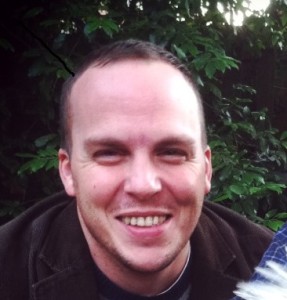 Clay Fuller is a research assistant for the Walker Institute of International and Area Studies, a sixth year PhD candidate (ABD) and adjunct instructor at the University of South Carolina, and he also teaches international relations online for Western Carolina University (NC). Clay studies non-democratic political institutions and the conditions under which these allow for liberal economic experimentation.
Clay Fuller is a research assistant for the Walker Institute of International and Area Studies, a sixth year PhD candidate (ABD) and adjunct instructor at the University of South Carolina, and he also teaches international relations online for Western Carolina University (NC). Clay studies non-democratic political institutions and the conditions under which these allow for liberal economic experimentation.
The title of his dissertation is ‘Authoritarian Liberalism: Dictatorship in the 21st Century.’ His dissertation proposes an alternative assumption to the 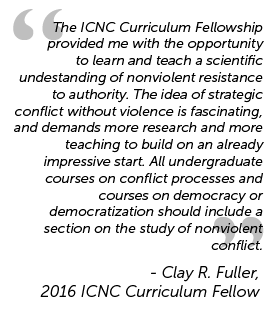 largely held belief that authoritarian regimes that grow the domestic economy and adopt semi-democratic political institutions will eventually lose control of the process and democratize. Essentially, modern authoritarian regimes are quite capable of adopting most of the necessary conditions for democracy while successfully avoiding the sufficient. His first field is comparative politics and second is international relations. Clay’s research resides in the nexus of these two fields and offers promising new data and insight concerning the use of special economic zones (SEZs) and sovereign wealth funds (SWFs). He regularly teaches an original topics course on modern dictatorships (to which this fellowship is applied) and regularly teaches basic international relations theory courses. View his CV here.
largely held belief that authoritarian regimes that grow the domestic economy and adopt semi-democratic political institutions will eventually lose control of the process and democratize. Essentially, modern authoritarian regimes are quite capable of adopting most of the necessary conditions for democracy while successfully avoiding the sufficient. His first field is comparative politics and second is international relations. Clay’s research resides in the nexus of these two fields and offers promising new data and insight concerning the use of special economic zones (SEZs) and sovereign wealth funds (SWFs). He regularly teaches an original topics course on modern dictatorships (to which this fellowship is applied) and regularly teaches basic international relations theory courses. View his CV here.
Course title: “Dictatorship and Civil Resistance in the 21st Century”
Location: University of South Carolina, Columbia, South Carolina, USA (August-December 2016)
Abstract: This political science course combines the traditionally domestic and/or area focus of comparative politics with the global and/or interstate levels of analysis associated with international relations. Authoritarianism, neo-authoritarianism, soft authoritarianism, dictatorship, monarchy, autocracy, totalitarianism, single-party regimes, military juntas, and the all-encompassing ‘non-democracy’ are merely a few of the many names given to world’s oldest and most common form of government. Despite ‘waves of democratization,’ in 2015 Freedom House reported that 55% of the world’s countries and 60% of the world’s population are not fully “free.” They also currently report a steady decline in freedom around the world for the entire past decade (freedom measured by civil liberties and political rights). This class explains and explores what these data and terminology mean, the methodologies used to generate these stats, and the major theoretical explanations for the continued survival of non-democracies and their leaders. In addition to learning the various theories concerning non-democratic survival, there are three other components to the course: 1) a section on data collection in dictatorships, 2) a semester-long computer simulation of the fall of a dictatorship to a civil resistance campaign, and 3) a large segment on civil resistance including its history, strategies, and tactics. It is actually not very difficult to remove a dictator from office relative to the difficulty of building a democratic society. The aim of this course is not only to educate students about the 80+ non-democratic regimes that exist today, but also to inspire students to learn more about the front end of the democratization process (removal of the dictator or regime) while simultaneously warning them about the pitfalls that face the group that replaces the regime.
Clay’s course evaluation & learning assessment
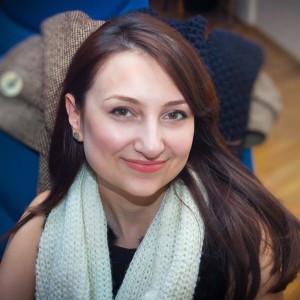 Lilit Makunts is currently an Associate Professor at Russian-Armenian University in Yerevan. She earned her Ph.D. in Cognitive Linguistics specializing in Political Discourse. She teaches Sociolinguistics, Cognitive Linguistics, and Discourse Analysis. After attending the Fletcher Summer Institute for the Advanced Study of Nonviolent Conflict in 2015 she initiated an academic course on Civil Resistance in the Department of Political Science this fall.
Lilit Makunts is currently an Associate Professor at Russian-Armenian University in Yerevan. She earned her Ph.D. in Cognitive Linguistics specializing in Political Discourse. She teaches Sociolinguistics, Cognitive Linguistics, and Discourse Analysis. After attending the Fletcher Summer Institute for the Advanced Study of Nonviolent Conflict in 2015 she initiated an academic course on Civil Resistance in the Department of Political Science this fall.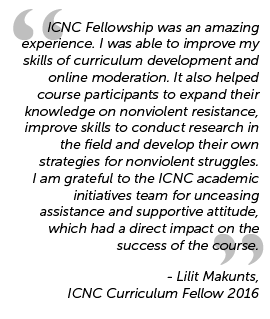
Still a student, she was very actively engaged in civic initiatives. Her aspiration for democratic changes in Armenia made her enter politics in 2004 and try to promote universal values. However, after about 8 years as a political board member in the Liberal Party of Armenia and the head of the youth organization (2004-2012) she realized that without civic education and the acknowledgment of people power among society no substantial democratic changes can take place. This was the major reason she quit political activity and started working with civil society groups and individuals. Together with academic teaching, she works as a trainer on different civil society platforms.
Course title: “Introduction to Civil Resistance: History and Strategies of Nonviolent Struggle”
Location: Online (November-December 2016)
Abstract: This is an online seminar that aims to provide civil society representatives, social/political activists and students with basic knowledge of civil resistance history as well as introduce them to strategies and tactics that are employed worldwide to make nonviolent resistance effective. The course intends to discuss various cases of nonviolent campaigns and movements and reflect on their efficiency by drawing parallels across local contexts. The course will begin with the introduction of civil resistance and its historical background and will focus on its common misconceptions. It will discuss the reasons why nonviolent campaigns succeed more often than violent ones and will touch upon the idea of people power and how it works. The seminar will further discuss strategic frameworks for analyzing campaigns and movements as well as explore issues of innovative and creative tactical choice. Cultural resistance will then be introduced as a creative way to challenge and fight oppression. The last component of the online course will be devoted to the discussion of the role of negotiations in civil resistance and the options regarding their application in nonviolent struggles in Armenia.
Lilit’s course evaluation & learning assessment
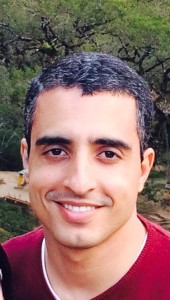 Etiene Martins is a Brazilian Federal Judge and a former police officer. He was a police officer for 16 years at Rio de Janeiro State, Brazil, and served at its Legal Department. In 2014, he was appointed Federal Judge and, currently, serves at the 4th Federal Court of Guarulhos City, District of São Paulo. He holds a B.A and a M.A in Public Security. In 2008, he earned LLB from the Federal University of the State of Rio de Janeiro. Since November 2015, Etiene Martins has been Professor of Constitutional Law and International Law at Enfase Institute (Brazil). Etiene has additionally started teaching Criminal Law at the D. João VI Police Academy. Etiene is active in the field of civil resistance training. He is a Kingian Nonviolence Conflict Resolution Co-Trainer affiliated with the Center for Nonviolence & Peace Studies (University of Rhode Island) In 2011, he attended the Kingian Nonviolence Training – Level I (University of Rhode Island) and, in 2015, the Fletcher Summer Institute on the Advanced Study of Nonviolent Conflict. In June this year, he will embark on the “Kingian Nonviolence Training – Level II – ADVANCED TRAINING in Leadership, Organization, Mobilization” at the University of Rhode Island. He is the author of the chapter “Law, Violence, and Public Security: Martin Luther King Jr.’s Philosophy Applied” published in the book Kingian Nonviolence: Applications for International & Institutional Change, 2015.
Etiene Martins is a Brazilian Federal Judge and a former police officer. He was a police officer for 16 years at Rio de Janeiro State, Brazil, and served at its Legal Department. In 2014, he was appointed Federal Judge and, currently, serves at the 4th Federal Court of Guarulhos City, District of São Paulo. He holds a B.A and a M.A in Public Security. In 2008, he earned LLB from the Federal University of the State of Rio de Janeiro. Since November 2015, Etiene Martins has been Professor of Constitutional Law and International Law at Enfase Institute (Brazil). Etiene has additionally started teaching Criminal Law at the D. João VI Police Academy. Etiene is active in the field of civil resistance training. He is a Kingian Nonviolence Conflict Resolution Co-Trainer affiliated with the Center for Nonviolence & Peace Studies (University of Rhode Island) In 2011, he attended the Kingian Nonviolence Training – Level I (University of Rhode Island) and, in 2015, the Fletcher Summer Institute on the Advanced Study of Nonviolent Conflict. In June this year, he will embark on the “Kingian Nonviolence Training – Level II – ADVANCED TRAINING in Leadership, Organization, Mobilization” at the University of Rhode Island. He is the author of the chapter “Law, Violence, and Public Security: Martin Luther King Jr.’s Philosophy Applied” published in the book Kingian Nonviolence: Applications for International & Institutional Change, 2015.
Course title: “Strategic Nonviolent Action, Peacemaking, Community Policing”
Location: D. João VI Police Academy, Rio de Janeiro-Brazil (October-November 2016)
Abstract: This is an online seminar that aims to introduce police officers to ideas and concepts of civil resistance scholarship and practice, and to show how important social and political changes can be brought about by nonviolent actions. The course also intends to make participants aware of how civil resistance campaigns can help to reduce violence and enforce the rule of law. Since civil resistance campaigns can play such an important role in fighting corrupt practices, state abuses and strengthening rule of law, police would benefit from understanding and gaining greater insight from the field of civil resistance studies. The course aims to teach its participants how to identify civil resistance campaigns, deconstruct misconceptions about civil resistance actions and nonviolent movements, and how to constructively work with activists and civil resistance campaigns. The course consists of five components: 1) an introduction to civil resistance through a historical and practical perspective; 2) an examination of nonviolent action in history, focusing on the Martin Luther King campaign; 3) a look into the strategies and skills that create successful civil resistance movements; 4) applying nonviolent action to policing; and 5) an exploration of the future of civil resistance. Collectively, these components examine the proponents, philosophies and techniques of nonviolent action in transforming violent conflicts into more constructive nonviolent contentions that will benefit resolution of personal interpersonal, societal, and international conflicts.
Etiene’s course evaluation & learning assessment
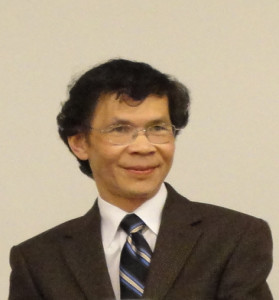 Dr. Truong Nong grew up in South Vietnam and came to America as a refugee in 1980 when he and his family escaped Vietnam in search of freedom. Dr. Nong earned a Bachelor of Science in Mathematics and a Master of Arts Degree in Political Science from the University of Houston, as well as a Ph.D. degree in Education, specializing in online education, at Northcentral University, Arizona, United States. He has been a part-time faculty member at the University of Houston, teaching the Vietnamese language and Viet-studies courses.
Dr. Truong Nong grew up in South Vietnam and came to America as a refugee in 1980 when he and his family escaped Vietnam in search of freedom. Dr. Nong earned a Bachelor of Science in Mathematics and a Master of Arts Degree in Political Science from the University of Houston, as well as a Ph.D. degree in Education, specializing in online education, at Northcentral University, Arizona, United States. He has been a part-time faculty member at the University of Houston, teaching the Vietnamese language and Viet-studies courses.
In addition to being an educator, Dr. Nong has been an activist in the Vietnamese-American community in Houston for the past 30 years. Currently, he serves as Advisor to the Executive Board of the Vietnamese Culture and Science Association (VCSA), a national Vietnamese American organization based in Houston. In this capacity, over the past eighteen years he has delivered a number of leadership workshops for VCSA’s annual youth-leadership camps. Further, since 2005 he has dedicated himself full-time to the establishment of the Institute for Civic Education (ICEVN), a non-profit institute that provides online civic education, leadership development, and business management to Vietnamese students worldwide. In addition to designing and teaching the online courses offered by ICEVN, Dr. Nong has written and published several articles on the democratization process in Asia that have appeared in Vietnamese diaspora magazines.
Course title: “Dynamics and Effectiveness of Civil Resistance: History and Strategies of Nonviolent Struggle in Vietnam”
Location: Online (January-February 2017)
Abstract: The online seminar provides an overview and analysis of the strategies that civil resistance movements have employed worldwide, particularly in dealing with oppressive regimes. The course will begin with an introduction to civil resistance– presenting the scope and power of civil resistance in both theory and practice, before moving to an exploration of the strategies and effectiveness of civil resistance movements. The course will then focus in on case studies of civil resistance in non-democracies, before locating participants specifically in the struggle for rights in Vietnam. Here the course will examine and analyze civil resistance practice and nonviolent movements throughout the history of Vietnam, and participants will develop an understanding of the Vietnamese Constitution’s framing and rights. The course will conclude with a discussion on the application of theory and strategies for civil resistance in repressive regimes—discussing and drawing lessons from the application of theory and strategies for civil resistance, to current conditions in Vietnam.
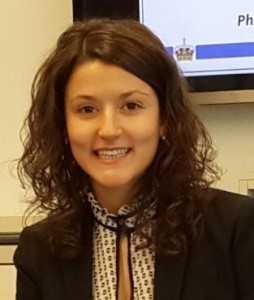 Ana Isabel Rodriguez is currently a PhD fellow in International Relations and Conflict Resolution at the University of Coimbra. She holds three Masters degrees, the most recent being from Georgetown University in Latin American Studies. Ana’s two other degrees are in International Relations and in European Union Studies, both from the Universidad CEU San Pablo, Madrid. Ana has received multiple scholarship awards: the FCT Scholarship, a mixed grant from the Government of Portugal and the European Union to do her PhD (2015-019); the Fulbright Scholarship, for her MA program at Georgetown University (2012-2014); and the “la Caixa” Scholarship, for her MA in International Relations at CEU San Pablo (2009-2010). Previously, she has worked as a researcher and consultant at various international organizations, think tanks, and universities– including the Inter-American Development Bank, Human Rights Watch, and CSIS in Washington DC, and the Institute of European Studies in Madrid.
Ana Isabel Rodriguez is currently a PhD fellow in International Relations and Conflict Resolution at the University of Coimbra. She holds three Masters degrees, the most recent being from Georgetown University in Latin American Studies. Ana’s two other degrees are in International Relations and in European Union Studies, both from the Universidad CEU San Pablo, Madrid. Ana has received multiple scholarship awards: the FCT Scholarship, a mixed grant from the Government of Portugal and the European Union to do her PhD (2015-019); the Fulbright Scholarship, for her MA program at Georgetown University (2012-2014); and the “la Caixa” Scholarship, for her MA in International Relations at CEU San Pablo (2009-2010). Previously, she has worked as a researcher and consultant at various international organizations, think tanks, and universities– including the Inter-American Development Bank, Human Rights Watch, and CSIS in Washington DC, and the Institute of European Studies in Madrid.
Course title: “Dynamics of Peace, Civil Resistance and Conflict”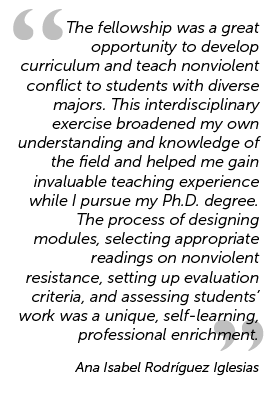
Location: University of Coimbra, Portugal (September-December 2016)
Abstract: The course ‘Dynamics of Peace, Civil Resistance and Conflict’ will include a unit of five modules focused specifically on the dynamics of civil resistance. The overall goal of this unit is to introduce students to the topic of civil resistance and nonviolent conflict, as part of the course’s larger inquiry into the theoretical debate on the ethics of security, violence and peace. The five civil resistance modules will cover: A) The concepts, dynamics and history of civil resistance; B) Skills and conditions for the success of the civil resistance movements; C) Types of civil resistance, with a particular focus on democratic transitions and civil resistance in democracies; and D) Practical analysis of recent and current movements, such as the Indignados movement in Spain, among others. The methodology of the course will include theoretical and practical classes, with in-class presentations from students, a documentary screening, and a talk featuring a guest speaker.